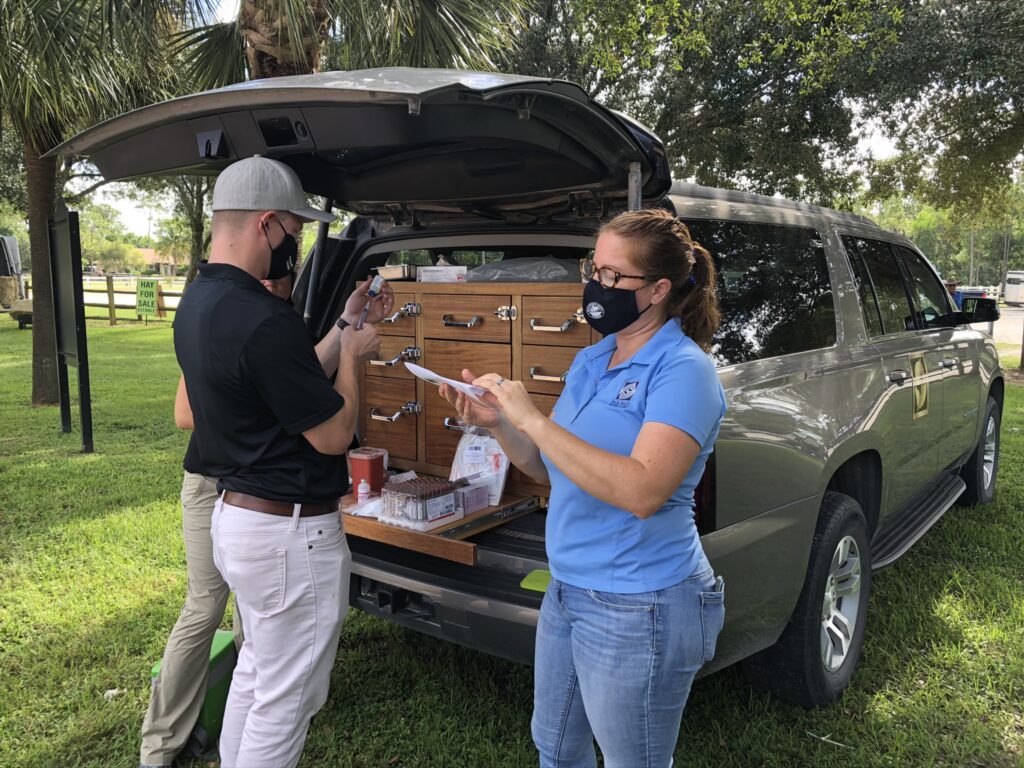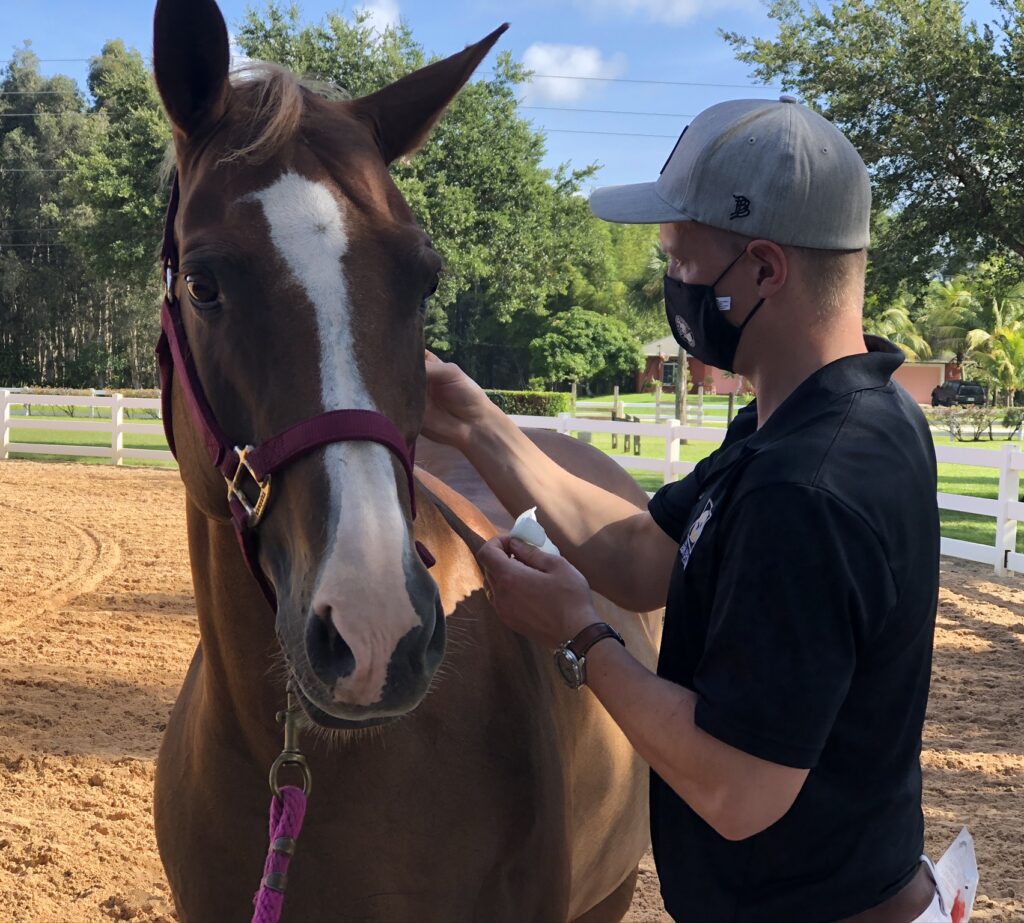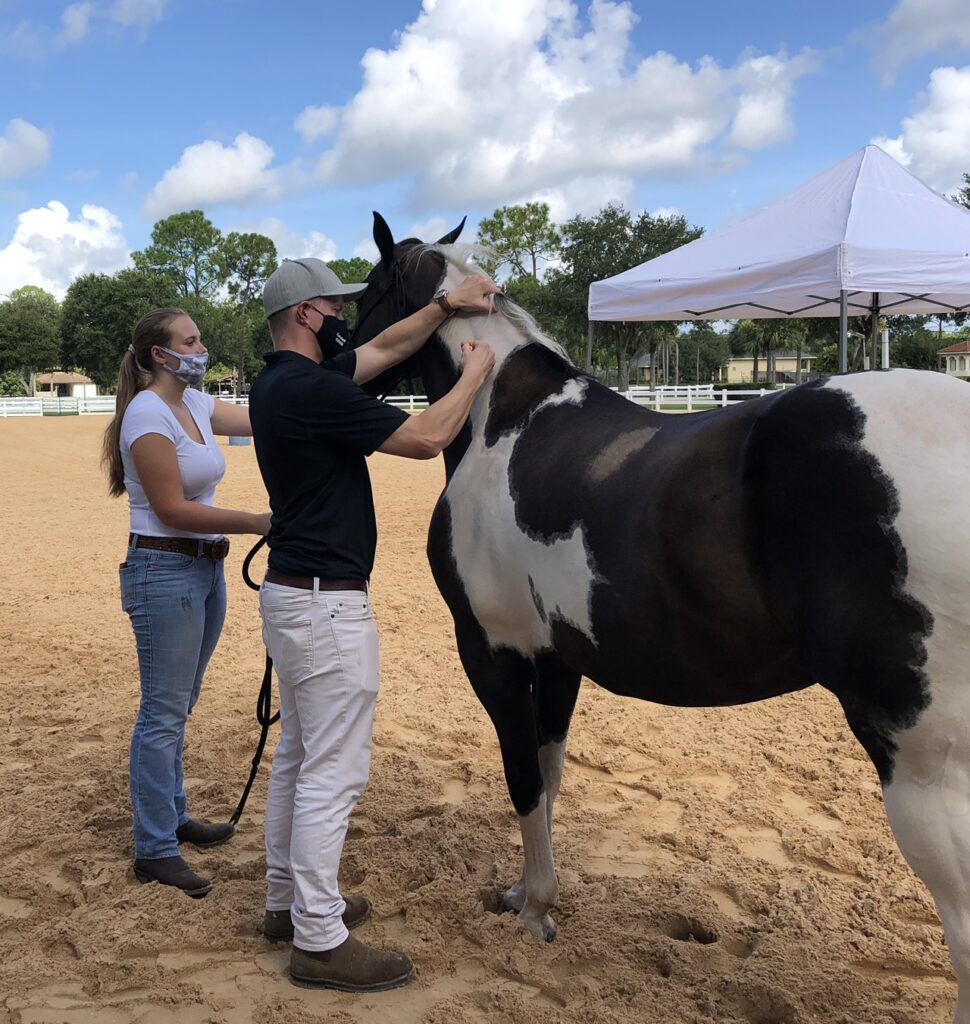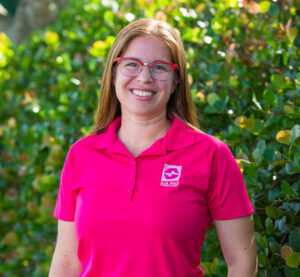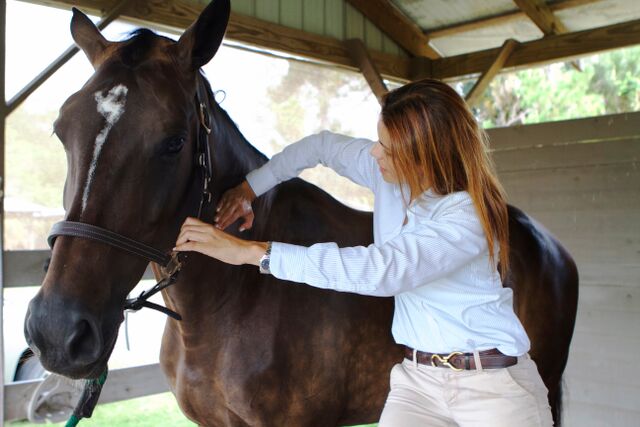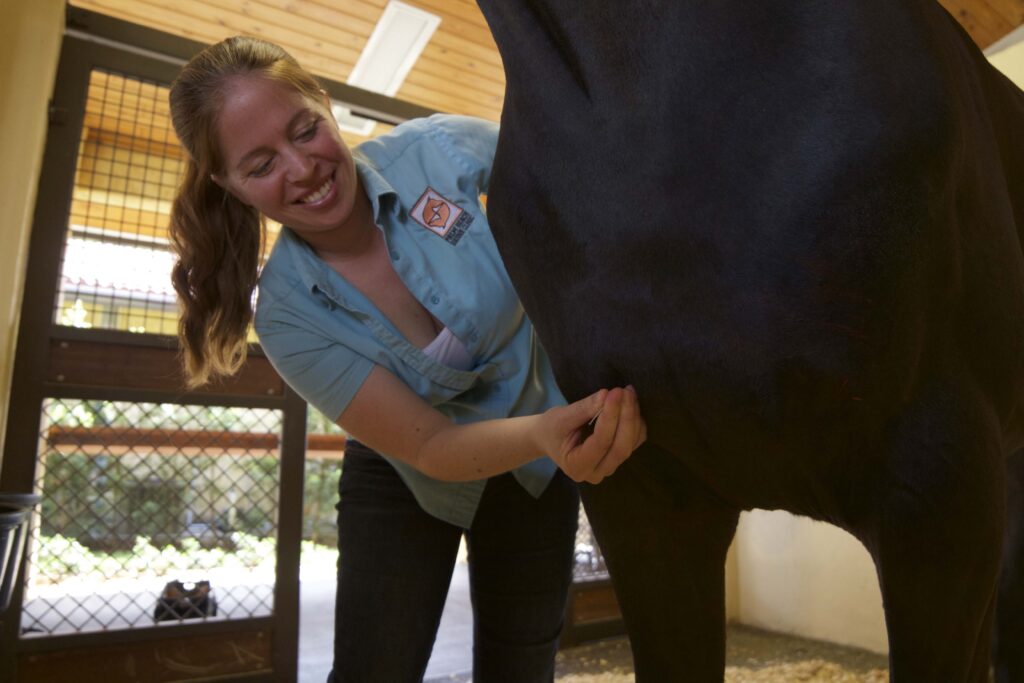Tag: greenfield
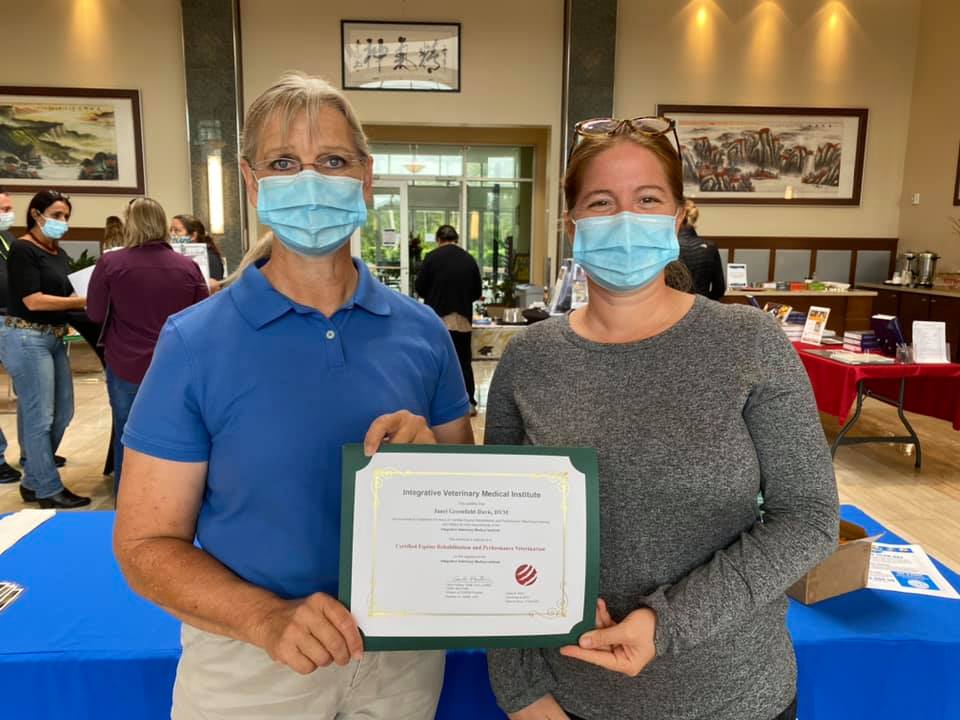
Dr. Janet Greenfield Davis has recently notched another professional title to her name as a Certified Equine Rehabilitation and Performance Veterinarian (CERPV). The certification through the Integrative Veterinary Medical Institute aims to enhance the high-level sport horse medicine practitioner’s ability to localize the root cause of performance deficits, evaluate the horse’s biomechanics on a segmented level, and select the appropriate rehabilitation tools. The CERPV distinguishes veterinarians who possess the knowledge and skills to spot slight variations in a horse’s gait and performance before they lead to lameness and deliver an elevated quality of rehabilitation management.
“I chose to pursue this certification as an extension of my understanding of the many intricacies with both movement and muscle of the sport horse. This deeper understanding goes toward helping keep my clients’ horses in the best condition for peak performance, heal stronger after injury, and prevent injuries from happening in the first place.”
Dr. Greenfield Davis
Dr. Greenfield Davis built on her knowledge of how the equine athlete functions through in-depth courses on the anatomy, biomechanics, and neuromuscular control in performance horses. Specific courses focused on the physiology and function of muscles, tendons, and joints with an emphasis on ways to develop strong tissue to avoid injury. Dr. Greenfield Davis analyzed how and when to apply specific rehabilitation tools; lasers, therapeutic ultrasound, transcutaneous electrical nerve stimulation, pulsed electro-magnetic field technology, vibration plates, hyperbaric therapy, hydrotherapy, and regenerative medicine. The certification also emphasized the effects of a foal’s environment on its future athletic performance, issues that may arise when conditioning young, growing horses, and nutrition at different levels of training.
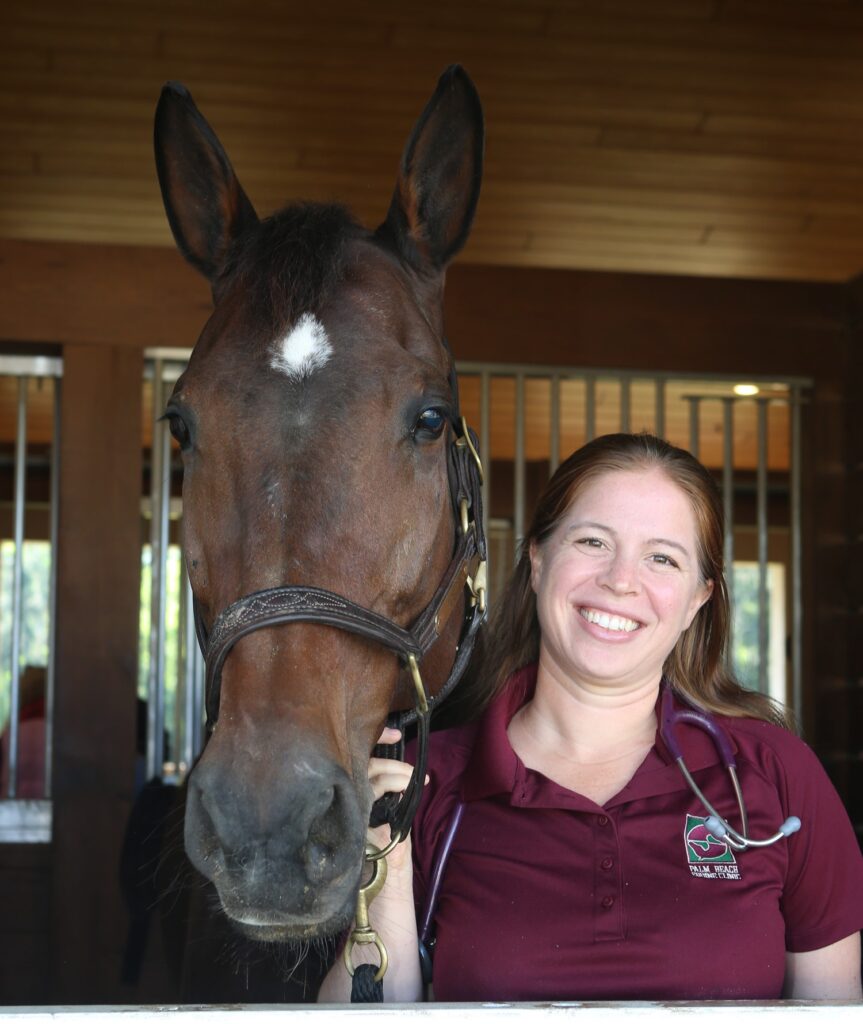
This CERPV adds to her current titles of Bachelors of Veterinary Medicine and Surgery (BVMS) from the University of Glasgow – a degree akin to US based universities’ Doctor of Veterinary Medicine – and her designation as a Member of the Royal College of Veterinary Surgeons (MRCVS). Dr. Greenfield also earned her Certification in Veterinary Acupuncture (CVA) through the Chi Institute (presently Chi University) which she applies to her large and small animal patients. Acting as a mentor to aspiring Chinese and alternative medicine practitioners, Dr. Greenfield has advised students enrolled in acupuncture studies. She has provided insight to many veterinary students through Palm Beach Equine Clinic’s Externship Program as well.
Palm Beach Equine Clinic provided veterinary services for horse owners as part of a new clinic series by the Acreage Landowners’ Association, Western Equestrian Shows and Trails, and the Indian Trail Improvement District.
Loxahatchee, FL (August 18, 2020) – Kicking off a first-of-its-kind clinic series for horse owners of western Palm Beach County, several Acreage groups enlisted the veterinary team of Palm Beach Equine Clinic (PBEC) to provide hurricane preparedness expertise. The clinic, held on August 15, 2020, at Nicole Hornstein Equestrian Park in Loxahatchee, Florida, was originally scheduled for the first of the month, but was postponed in true Florida fashion due to Hurricane Isaias.
The Equine Hurricane Preparedness Clinic garnered a couple dozen attendees, masked up with their horses in tow. Kim Emmons, Western Equestrian Shows and Trails (WEST) Clinic Director and certified equine veterinary technician, is the driving force behind the event series.
“I’ve lived in and have been active in our local equestrian community for over 20 years,” said Emmons, who led the discussion on best practices for horse owners during hurricane season.
“The goal of this clinic series is to educate our local equestrian community and provide opportunities for horse owners of all ages and disciplines to become better, more well-rounded horsemen.”
Kim Emmons
Through attending equestrian events, teaching at camps, and her experience as a veterinary technician, Emmons has met many horse owners who lack the correct skills and knowledge on basic horse health and care. “I have always found it really rewarding to share my knowledge by teaching people the proper, practical skills for caring for their horses. Things such as correct leg bandaging, taking their horse’s vitals, listening to gut sounds, and teaching people on when they need to call a veterinarian are all essential for a horse owner to know. I used to teach an equine healthcare camp, and I am so proud to see those young campers grow into the smart, well-rounded equestrians they are today.”
The clinic series is free to attend, with fees for trailering in and offered membership packages, and will be based at Nicole Hornstein Equestrian Park for the foreseeable future.
PBEC provided special reduced rates on equine vaccinations, Coggins (Equine Infectious Anemia) testing, and microchipping services performed by Dr. Janet Greenfield-Davis and Dr. Charley McColough.
“We understand that, especially now in these pandemic times, many people are struggling to cover their horse’s expenses,” said PBEC veterinarian Dr. Greenfield-Davis. “We are happy to be here for the community by providing these essential services at more affordable prices and in a more convenient location for the Acreage horsemen.”
WEST, a new subcommittee of the Acreage Landowners’ Association (ALA), is led by fellow longtime Acreage resident Dixie Thiery.
“All of our efforts are focused on promoting and protecting the wonderful equestrian lifestyle we are lucky to enjoy here,” said Thiery. “We hope that WEST and this clinic series will help strengthen our community by giving people an easy, convenient way to learn and meet their neighboring equestrians. We are also very fortunate to be supported by the Indian Trail Improvement District, which is responsible for this park, and we are working with them to update our local trail system maps and better plan for equestrian-safe roadways and developments.”
ALA, WEST, ITID and PBEC plan to work together in the future by collaborating to bring horse shows, tack sales, exhibitions, and other educational events for equestrians to the area. The association’s next clinic is planned for September 19 and will focus on basic equine first aid.
From The Pharmacy: New Xiang Ru San
Option for Anhidrosis

Palm Beach Equine Clinic is proud to offer a wide range of treatments and therapies, including select Chinese herbal medicines. New Xiang Ru San is one such herbal medicine that can be used to treat horses suffering from anhidrosis, or the inability to sweat normally. Anhidrosis can be a common challenge, particularly in hot, humid climates. New Xiang Ru powder has proven to be a clinically effective aid for non-sweaters as it promotes heat and fluid disbursement through healthy sweating. New Xiang Ru San is a blend of the Chinese herbs Bian Dou (hyacinth bean), Xiang Ru (mosla), Hou Po (magnolia bark), Lian Qiao (forsythia) and Jin Yin Hua (honeysuckle flower).
Chinese herbal medicine is a relatively new treatment among equine veterinarians in the western world, but the philosophy of using herbals in healing has existed for thousands of years as part of Traditional Chinese Veterinary Medicine (TCVM). An adaptation of all-natural methods used to treat humans, herbal medicine for animals utilizes ancient Chinese formulas aimed at understanding and treating the underlying causes of a particular disease or illness in order to help the body heal itself, rather than only treating the presented symptoms.
Talk to your PBEC veterinarian about options for treating anhidrosis or call 561-793-1599 to set up an appointment.
Appointment Request
Please fill out this form and our staff will contact you to confirm an appointment.
Feature in the March 2019 issue of Wellington The Magazine
The horses at the Vinceremos Therapeutic Riding Center perform miracles every day. Whether by carrying a person coping with a physical disability to a sense of independence, providing comfort to a soul suffering from emotional trauma or teaching a child beyond the confines of a classroom, the Vinceremos horses are heroes. But they aren’t the only ones wearing capes. A local group of dedicated and passionate equine veterinarians share in the magic.
The veterinarians of the Palm Beach Equine Clinic (PBEC), based in the heart of Wellington, have been caring for horses in South Florida for decades. Founded by Dr. Paul Wollenman in 1981, PBEC has grown to include a staff of 40 veterinarians, with five boarded specialists and the most state-of-the-art facility in the country. Situated in the winter equestrian capital of the world, Palm Beach Equine Clinic treats the top-performing show jumping, dressage, polo and racing athletes throughout the year.
Official Veterinarians of Vinceremos Therapeutic Riding Center
In addition, the clinic is a saving grace for the horses of Vinceremos. The 23 specially selected horses stay true to the nonprofit’s mission of conquering disability and hardship in people of all ages. Founded in 1982, Vinceremos, based in Loxahatchee Groves, serves people from all stations in life with physical, cognitive and emotional disabilities through the power of equine therapy. The treatments they offer include therapeutic riding and carriage driving, hippotherapy, equine-assisted learning and equine-assisted psychotherapy.
Palm Beach Equine Clinic does its part by keeping the horses healthy and happy with pro-bono veterinary care.
“We have the people and, most importantly, the horses, of South Florida to thank for the success that PBEC has enjoyed over the years,” said Palm Beach Equine Clinic President Dr. Scott Swerdlin, who spearheaded the clinic’s involvement with Vinceremos in 2011. “It is our honor to give back to that community through our work with Vinceremos. The whole team is dedicated to each and every horse we treat, as well as to the riders who love them.”

Healing Together
While their commitment to the nonprofit is extensive, it’s not about the hours spent or the cost of time and supplies. Swerdlin and his team focus on a bigger goal; healing horses so they can heal people. “There’s no greater reward than seeing how the horses of Vinceremos benefit their riders,” he said. “You see the riders light up and how excited they are to be on those horses.”
Swerdlin is proud of the clinic’s work with Vinceremos. “I continually remind my team that it is a privilege to treat the caliber of horses we have in Wellington and that should compel us to give back to the community,” he said. “The response from Palm Beach Equine Clinic veterinarians has been overwhelming. The entire team has volunteered to be involved.”
From routine treatments and services, such as vaccinations and health exams, to emergency care, Palm Beach Equine Clinic veterinarians are available to Vinceremos night and day. Last summer, such emergency care was called on, and one Vinceremos horse got a second chance at life thanks to a group of devoted veterinarians.
Clark Kent
Vinceremos favorite Clark Kent — a sturdy black mount with an eye as kind as they come — suffered an injury to his right front leg. The laceration extended into his tendon sheath, which is a layer of membrane around a tendon on the back of the lower leg. What could have been a simple cut on the surface was much more serious.
Initially treated on-site at Vinceremos by Dr. Marilyn Connor, Clark Kent was then transported to PBEC for surgery to repair the injury. The case turned into a team effort and involved the work of surgeons Dr. Weston Davis and Dr. Michael Myhre, as well as Dr. Janet Greenfield.
After surgery and a recovery period at PBEC’s onsite equine hospital, Clark Kent returned to Vinceremos to recover. He was back to his therapy work by fall, giving riders a sense of independence and confidence with his skills on the lunge line and his forward way of moving.
“This treatment was no easy feat, but the veterinarians and staff of Palm Beach Equine Clinic took a tragedy and turned it into a miracle. Clark Kent was surrounded by extraordinary veterinarians and technicians throughout his care,” Vinceremos Director of Development Susan Guinan said. “The diligence of this team makes miracles happen every day. We are so appreciative of Palm Beach Equine Clinic and their team of veterinarians. They give so much support to Vinceremos and the horses here. They keep them in top shape so we can impact our community in such a special way through equine therapy.”
Rewarding for Horses and Humans
For Connor, it’s cases like Clark Kent’s that convinced her to pursue veterinary medicine. Growing up around horses, she spent time volunteering with a therapeutic riding program before attending veterinary school at Texas A&M.

“It was a very rewarding experience to be able to give back to a cause that is important to me. And even more so now that I can do that in a different capacity as a veterinarian,” said Connor.
She can often be found checking on the horses of Vinceremos while on the job. “Being able to help horses as special as the ones at Vinceremos and the people who love them is what ultimately made me realize I wanted to be an equine veterinarian,” Connor said.
To find out more about the Palm Beach Equine Clinic, call (561) 793-1599.
Chinese herbal medicine is a relatively new treatment among equine veterinarians in the western world, but the philosophy of herbals for healing has existed for thousands of years as part of Traditional Chinese Veterinary Medicine (TCVM). Helping to lead the Chinese herbal medicine charge westward, veterinarians at Palm Beach Equine Clinic (PBEC) have incorporated the use of herbs and herbal treatments as an integral part of their alternative therapy options for patients.
Similar to the use of all-natural methods to treat illness in humans, herbal medicine for animals also utilizes ancient Chinese formulas aimed at treating the underlying causes of a disease or illness to help the body heal itself, rather than only temporarily treating the presented symptoms.
One PBEC veterinarian who has found these all-natural methods as a benefit in her treatments is Dr. Janet Greenfield-Davis, who specializes in both acupuncture and Chinese herbal medicine.
“There is an herbal product for anything,” said Dr. Greenfield-Davis, who found herbal medicine six years ago when she started specializing in acupuncture, which joins Chinese herbal medicine as two of the most common forms of TCVM therapies. “Herbals treat a variety of ailments from sore muscles to problems affecting the liver, heart, kidneys, joints, and more. I pair the herbals with my acupuncture, which is traditionally the ancient Chinese way.”
Traditional Chinese Veterinary Medicine (TCVM) Methods

In TCVM, once a symptom of disharmony in the body or disease is identified, treatment proceeds through four possible branches, including acupuncture, food therapy, a form of Chinese medical massage called Tui-na, and Chinese herbal medicine. From topical treatments, including salves and powders, to edible treatments, Chinese herbal medicine not only draws on natural products, but also on the natural tendencies of the horse itself. Being herbivores, horses ingest herbs found in the wild while they are grazing.
While the traditional methods date back thousands of years, the treatments developed within Chinese herbal medicine are ever-evolving. Coupled with modern technology, historical and ancient Chinese wisdoms are still very effective. In addition, the treatments utilize the properties of many common herbs with widely known uses. By utilizing ginseng for fatigue, chamomile for calming, garlic as an antibiotic, and arnica as an anti-inflammatory, the recipes used in herbal medicine draw from only natural sources. This is making herbal treatments more common among sport horses that undergo drug testing for banned substances while competing.
“The competitive world is accepting herbal medicine more and more every year,” said Dr. Greenfield-Davis. “It provides an alternative for horses at high levels, especially in FEI classes, that need a little extra support. They aren’t drugs, they don’t test, and they are a natural product.”
Alternative Options
Dr. Greenfield-Davis believes that offering such alternative treatment options is a sizeable advancement for PBEC, in that herbal medicines provide owners with another option when traditional western medicines may not be their preference.
“It enhances our practice because it gives owners a place to turn,” she said. “There is a lot of stigma to using particular western drugs, and I think this gives people a choice; they don’t have to use the traditional western medicines anymore because they can now turn to eastern medicines.”
While it is a personal choice to use a more holistic or all-natural approach to veterinary care for some horse owners, herbs also represent a practical alternative. According to Dr. Greenfield-Davis, herbal medicine is the perfect choice when treating a horse with an aversion to needles, or for horses that do not respond to particular medicines or therapies.
“We are able to work in a more natural way instead of using steroids and things of that nature,” added Dr. Greenfield-Davis. “In some cases, I will use solely herbals and the treatments produce a lot of wonderful results.”
As PBEC continues to advance its alternative medicine therapies, the equestrian community is also learning to accept new possibilities. For PBEC and Dr. Greenfield-Davis, Chinese herbal medicine is a step into the future with a nod to ancient Chinese history.
About Dr. Janet Greenfield-Davis
Dr. Greenfield-Davis grew up in Northern California, and her passion for horses started during her time showing hunters on the “A” circuit, which later led her to study veterinary medicine at California Polytechnic State University. She graduated from veterinary school at the University of Glasgow in 2010 and has since specialized in equine acupuncture and herbal medicine. Dr. Greenfield-Davis hopes to continue her studies in holistic medicine by incorporating food therapy into her treatments at Palm Beach Equine Clinic.
Whether it’s for an Olympic hopeful or a reliable trail horse, Palm Beach Equine Clinic has more than 30 years of proven success keeping horses healthy and happy while working to extend their performance careers. In addition to innovative veterinary services that utilize advanced diagnostic tools and surgical equipment, Palm Beach Equine Clinic also offers alternative therapies to optimize health and increase the longevity of the horse’s performance career.
Veterinary chiropractic manipulation, acupuncture, and Chinese herbal medicine are three alternatives to standard medical treatments offered at Palm Beach Equine Clinic. While all of Palm Beach Equine Clinic veterinarians are versed in the many aspects of equine medicine, several of the doctors have studied extensively in alternative therapies. Dr. Natalia Novoa treats horses with chiropractic manipulation and acupuncture, and Dr. Janet Greenfield-Davis focuses on acupuncture treatment and uses Chinese herbal medicine to bring out the best in her patients.
Alternative Therapies for a Competitve Edge

“The line between success and failure is very thin for performance horses, and a lot of these alternative therapies can be very useful in giving the horse that little bit more,” explained Palm Beach Equine Clinic’s Dr. Richard Wheeler. “Chiropractic and acupuncture are just two of the alternative therapies that we offer. They are both conjunctive therapies that can keep horses comfortable, happy and performing well.
“Both chiropractic manipulation and acupuncture can get the horse moving and feeling better, and help to maintain some minor chronic problems that they may have, therefore avoiding more invasive treatments,” Dr. Wheeler continued. “For neck or back pain, once we diagnose a problem, we may treat it and then follow up with a program of alternative therapies. These therapies are used with the aim of keeping the horse supple and moving with ease and helping the musculature to work correctly. We work with the trainers to optimize muscle development so that we can fix the problem and keep the horse moving forward and performing at their top level.”
Alternative Therapy: Equine Acupuncture
Fellow Palm Beach Equine Clinic veterinarian, Dr. Janet Greenfield-Davis is skilled in acupuncture and herbal medicine. Acupuncture is a form of treatment used in both traditional and classical Chinese medicine. It is based on the principle that there are energetic pathways, or channels, throughout the body that influence associated internal organs and structures. Energy from these pathways surfaces at various points on the body, identified as acupuncture points. Extremely fine gauge needles are inserted at selected points, stimulating these points and thereby activating the body’s natural healing abilities.
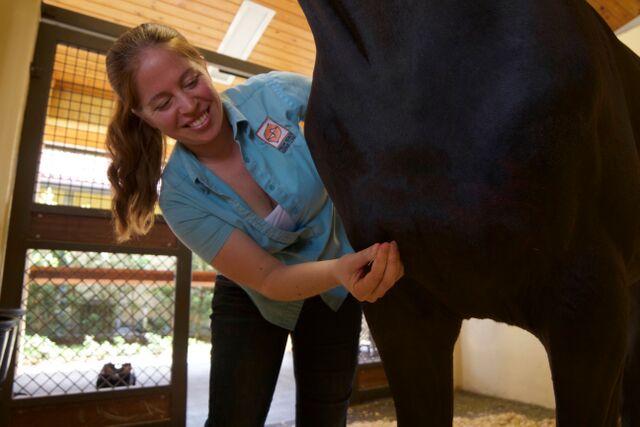
“We offer acupuncture, chiropractic and herbal medicine as an alternative or adjunct therapy to your current veterinary protocol,” Dr. Greenfield-Davis explained. “With acupuncture, we stimulate particular points that can relieve pain, increase endorphins, calm, and improve health and body function in horses. These specific points have a high capacity of nerve endings, lymphatic vessels, and blood vessels, as well as hormone stimulation.”
Clinical trials indicate that acupuncture may be an effective adjunct therapy for musculoskeletal problems such as muscle soreness, back pain, disc problems, osteoarthritis, and degenerative joint disease. Acupuncture may help neurological disorders such as laryngeal hemiplegia, and facial and radial nerve paralysis. It can help with gastrointestinal disorders including diarrhea, gastric ulcers, colic, and impaction. Acupuncture may also help with respiratory diseases, metabolic and endocrine diseases, and other chronic conditions, such as anhidrosis, heaves, asthma, cough, uveitis, and behavioral problems.
Alternative Therapy: Veterinary Chiropractic Manipulations
Alternative therapies such as acupuncture and chiropractic manipulation are increasingly popular amongst sport horse owners, and Palm Beach Equine Clinic’s Dr. Natalia Novoa offers both forms of treatment.
“Chiropractic adjustment is an excellent complementary modality that can be used for diagnosis, treatment, and prevention of selected neuromusculoskeletal disorders,” Dr. Novoa explained. “The practice of chiropractic focuses on the relationship between structure (primary spinal column) and function (coordinated by the nervous system) to restore it. The goal is to treat soft tissue injuries or articular dysfunction to optimize health through manual therapy and to detect and treat abnormalities and alleviate pain.”
Veterinary chiropractic manipulation is thought to optimize equine health by restoring the normal joint motion, reversing mild pathology, and helping to slow the progression of degenerative joint and spine disease. Over the years, this therapy has become a valuable adjunct for competition horses.
Chiropractic manipulation is also a great treatment option for horses that suffer neck and back pain, nerve damage, poor performance, behavioral problems, muscle spasms, localized or regional joint stiffness, unexplained lameness, gait abnormalities asymmetry/muscle imbalance/atrophy, injuries resulting from falls, trauma (such as slips, getting cast in the stall, or missteps), or poor fitting equipment.

“I identify the restricted movement or subluxations by manipulating and evaluating the joint mobilization. Then I restore the joint motion with an adjustment, which is a manually controlled force applied to a specific joint,” Dr. Novoa said of the process. Chiropractic and acupuncture therapies are complementary treatments for lameness problems and other issues. They are alternative methods and do not replace conventional veterinary medicine or surgery, but can be very useful in maintaining top performance levels in your horse.
“There has been an increase of interest in non-traditional therapy, and Palm Beach Equine Clinic is aware of its great value, so we provide the services to allow our horses to reach maximum performance potential and overall health,” Dr. Novoa concluded.

For over 30 years, Palm Beach Equine Clinic (PBEC) has offered an unwavering commitment to the care of your horse, whether an Olympic athlete or reliable trail horse. PBEC’s goal is to keep your horse healthy and happy while extending their performance career. PBEC offers innovative veterinary services with the assistance of state-of-the-art diagnostic tools and surgical equipment. They also offer several equine alternative therapies that can optimize your horse’s health and increase the longevity of their career.
Veterinary chiropractic manipulation, acupuncture, and Chinese herbal medicine are three alternatives to standard medical treatments offered at PBEC.
While all of PBEC’s 28 veterinarians are versed in all methodologies of equine medicine, several of the doctors have studied extensively in equine alternative therapies. Dr. Natalia Novoa treats horses with chiropractic manipulation and acupuncture. Dr. Janet Greenfield-Davis focuses specifically in acupuncture treatment and also uses Chinese herbal medicine to bring out the best in her patients.
PBEC’s Dr. Richard Wheeler spoke of how equine alternative medicine can be used to improve your horse’s chance for success and treat many different issues.
Alternative Therapies for Performance Horses
“The line between success and failure is very thin for performance horses, and a lot of these alternative therapies can be very useful to give the horse that little bit more,” Dr. Wheeler explained. “Chiropractic manipulation and acupuncture are two alternative therapies that we offer. They are both conjunctive therapies that can keep horses comfortable, happy and performing well.”


“Both chiropractic manipulation and acupuncture can get the horse moving a little bit better and can help to maintain some minor chronic problems that they may have, therefore avoiding more invasive treatments,” Dr. Wheeler continued. “For neck or back pain, once we diagnose a problem, we may treat it and then follow up with a program of equine alternative therapies. These therapies are used with the aim of keeping the horse supple, and moving with ease, and helping the musculature to work correctly. We work with the trainers to optimize muscle development so that we can fix the problem and keep the horse moving forward and performing at the top level.”
Equine Acupuncture
Dr. Janet Greenfield-Davis is one of the veterinarians at PBEC that is skilled in acupuncture and herbal medicine. Acupuncture is a form of treatment used in both traditional and classical Chinese medicine. It is based on the principle that there are energetic pathways, or channels, throughout the body that influence associated internal organs and structures. Energy from these pathways surface at various points on the body, identified as acupuncture points. Extremely fine gauge needles are inserted at selected points, stimulating these points and thereby activating the body’s natural healing abilities.
“We offer acupuncture, chiropractic and herbal medicine as an alternative or adjunct therapy to your current veterinary protocol,” Dr. Greenfield-Davis explained. “With acupuncture, we stimulate particular points that can relieve pain, increase endorphins, calm, and improve health and body function in horses. These specific points have a high capacity of nerve endings, lymphatic vessels, and blood vessels, as well as hormone stimulation.”
Clinical trials indicate that acupuncture may be an effective adjunct therapy for musculoskeletal problems, such as muscle soreness, back pain, disc problems, osteoarthritis, and degenerative joint disease. Acupuncture may help neurological disorders, such as laryngeal hemiplegia, and facial and radial nerve paralysis. It can help with gastrointestinal disorders, such as diarrhea, gastric ulcers, colic, and impaction. Acupuncture may also help with respiratory diseases, metabolic and endocrine diseases, and other chronic conditions, such as anhidrosis, heaves, asthma, cough, uveitis, and behavioral problems.
Equine alternative therapies such as acupuncture and chiropractic manipulation have gained popularity over the past years. Offering these therapies allows PBEC to treat horses in other ways in addition to their standard practices of equine medicine. Dr. Natalia Novoa is one of the veterinarians at PBEC who offers both chiropractic and acupuncture therapies for clients.
Veterinary Chiropractic Manipulation
“Chiropractic is an excellent complementary modality that can be used for diagnosis, treatment, and prevention of selected neuromusculoskeletal disorders,” Dr. Novoa explained. “The practice of chiropractic focuses on the relationship between structure (primary spinal column) and function (coordinated by the nervous system) to restore it. The goal is to treat soft tissue injuries or articular dysfunction to optimize health through manual therapy and to detect and treat abnormalities and alleviate pain.”


Veterinary chiropractic manipulation is thought to optimize equine health by restoring the normal joint motion, reversing mild pathology, and helping to slow the progression of degenerative joint and spine disease. Over the years, this therapy has become a valuable adjunct for competition horses.
Chiropractic manipulation is also a great treatment option for horses that suffer neck and back pain, nerve damage, poor performance, behavioral problems, muscle spasms, localized or regional joint stiffness, unexplained lameness, gait abnormalities asymmetry/muscle imbalance/atrophy, injuries resulting from falls, trauma (such as slips, getting cast in the stall, or missteps), or poor fitting equipment.
“I identify the restricted movement or subluxations by manipulating and evaluating the joint mobilization. Then I restore the joint motion with an adjustment which is a manual controlled force applied to a specific joint,” Dr. Novoa said of the process.
Complementary Sport Horse Medicine
Chiropractic and acupuncture therapies are complementary treatments for lameness problems and other issue. They are alternative methods and do not replace conventional veterinary medicine or surgery, but can be very useful in maintaining top performance levels in your horse.
“There has been an increase of interest in non-traditional therapy, and PBEC is aware of its great value, so we provide the services to allow our horses to reach maximum performance potential and overall health,” Dr. Novoa concluded.
Palm Beach Equine Clinic provides experience, knowledge, availability, and the very best care for the horses of Wellington. Have them be a part of your team! To find out more, please visit www.EquineClinic.com or call 561-793-1599.
A leader in sport horse medicine, Palm Beach Equine Clinic (PBEC) is a mainstay in the equestrian-centric Village of Wellington in South Florida. Known as the ‘Winter Equestrian Capital of the World,’ Wellington welcomes equestrians from around the globe to compete. Palm Beach Equine Clinic is the Official Veterinarians of events such as the Winter Equestrian Festival (WEF) and the Adequan® Global Dressage Festival (AGDF). PBEC is dedicated to providing exceptional care to the horses and equally committed to strengthening relationships within the local community.
PBEC President Dr. Scott Swerdlin strongly encourages his veterinarians to share their expertise and get involved in philanthropic community relations in Wellington. Many of the veterinarians generously donate their time and energy to many different projects throughout the community each year.
Official Veterinarians of Vinceremos Therapeutic Riding Center
One local organization that PBEC annually supports in various ways is Vinceremos Therapeutic Riding Center (VTRC). Vinceremos Therapeutic Riding Center is a 501 (c) 3 not-for-profit corporation that provides therapeutic horseback riding to those with disabilities and hippotherapy in Palm Beach County since 1982. Dr. Swerdlin sits on Vinceremos Therapeutic Riding Center’s Board of Directors and also serves on the organization’s Executive Committee.
“Vinceremos is an exceptional organization,” Swerdlin stated. “There is nothing that you can possibly do that will make you feel better than spending time at Vinceremos and being involved in that organization. It is horse oriented, but what they are doing is providing solutions for children who are disabled. The way they light up and how excited they are to be on those horses is amazing to see. All of a sudden, that disadvantage disappears. You see it in their faces, you see it in their smiles. And, you see it in every aspect of their well-being. To see the improvement in the health and the capabilities of these children is amazing.”
Team Effort
All of the doctors at PBEC have been involved with Vinceremos Therapeutic Riding Center in some way, but two women who have gone above and beyond for the program are Dr. Janet Greenfield-Davis and Dr. Jordan Lewis.
“Janet just had her second child and Jordan just had her first child, and they both put a lot of time and energy into helping other children,” Dr. Swerdlin noted. “What I try to do is coach a philosophy, and that philosophy is how fortunate we all are to be here in this community taking care of these kinds of horses and clients, and that we owe something back. We need to appreciate what we are doing and try to give back to the community.”
For Dr. Greenfield-Davis, donating her time and expertise at Vinceremos Therapeutic Riding Center is fun and rewarding work. She serves as the primary veterinarian to VTRC, treating the horses on an as-needed basis and helping with pre-purchase exams and evaluations of donated horses. As Official Veterinarians, Palm Beach Equine Clinic offers the talents and knowledge of all its doctors, who are called upon when needed.
“It is a spectacular program,” said Dr. Greenfield Davis. “I have been working with Vinceremos for the last four years, and I have learned so much. What they provide is a huge benefit for those kids. Even the kids who volunteer that are shy or have communication problems, they, too, just blossom there.
“I think it is important for us to give back to the community,” Dr. Greenfield-Davis added. “We are a rather large fixture in the community. We are one of biggest equine hospitals in the area and for us to help and contribute to their program is important for all of us.”
She continued, “Everybody at the clinic has been there at one point or another; everybody chips in. The clinic foots the bill for all of the horses there and all of the official veterinarians and surgeons donate their time and services. It is fun, too. They invite us to their horse shows and events, and we all have a good time.”

Additional Charity Involvement in Wellington
In addition to PBEC’s contributions with VTRC, the clinic donates to JustWorld International, an organization of equestrians funding and sustaining education, nutrition, and health programs for children in Cambodia, Guatemala, and Honduras. PBEC has supported JustWorld International since its inception.
Other charitable work includes donations to the Great Charity Challenge, presented by Fidelity Investments® (GCC), which is hosted each year during the Winter Equestrian Festival. The pro-am team competition has distributed more than $7.5 million to over 150 nonprofits in Palm Beach County over the last six years. Founded in 2010 by Equestrian Sport Productions CEO Mark Bellissimo and his daughter Paige, the Great Charity Challenge has seen the equestrian community take charitable giving to a new level through their love of horses. PBEC is proud to be a part of such a fantastic event.
“The Great Charity Challenge is so much fun. You see these riders just barreling to try to win for their charity,” said Dr. Swerdlin. “Vinceremos was chosen (as a charity recipient for the GCC) this year, so we are very excited and hope to have a big turnout. I enjoy the competition and the mystery of who is going to win and what the charities will get. The way they have it devised so that it is such a win-win for all of the charities is wonderful. It is just fun for everybody, and it is such a good cause.”
Local Veterinary Educational Opportunities
Official Veterinarians for Wellington High School Equine Pre-Vet Program
Education of the public is also on the forefront of PBEC’s community involvement. Currently, through Wellington High School’s (WHS) Equine Pre-Vet Program, PBEC has a hands-on program for students looking to pursue a career in veterinary medicine.
Wellington High School seniors that choose to pursue the Equine Pre-Vet Program have a wealth of knowledge at their fingertips with one of the most advanced equine medical centers just down the road. Through the program at WHS and the generosity of the veterinarians at PBEC, students in the Equine Pre-Vet Program have the unique opportunity to learn all about the profession by shadowing the very best.
Knowledge from the entire Veterinary Team
Dr. Janet Greenfield-Davis is also very involved with this program and mentors the senior students. “We try to play an active role in our community, and we really enjoy having the kids visit the clinic,” Greenfield-Davis stated.

Dr. Swerdlin added, “We have board certified radiologists, we have three boarded surgeons, we have boarded internal medicine veterinarians, and we have boarded
radiologists, we have three boarded surgeons, we have boarded internal medicine veterinarians, and we have boarded ophthalmologists. We also have the most high-tech diagnostic equipment, so for a young veterinarian, PBEC is paradise. We like spending the time to teach American veterinarians as well as foreign veterinarians. I think we are improving the success and the health of horses all over the world by offering those opportunities.”
Palm Beach Equine Clinic enjoys getting involved in the community and looks forward to continued involvement in 2016. Palm Beach Equine Clinic provides experience, knowledge, availability, and the very best care for the horses of Wellington. Have them be a part of your team! To find out more and speak with an official veterinarian, call 561-793-1599.
Meet Dr. Janet Greenfield-Davis
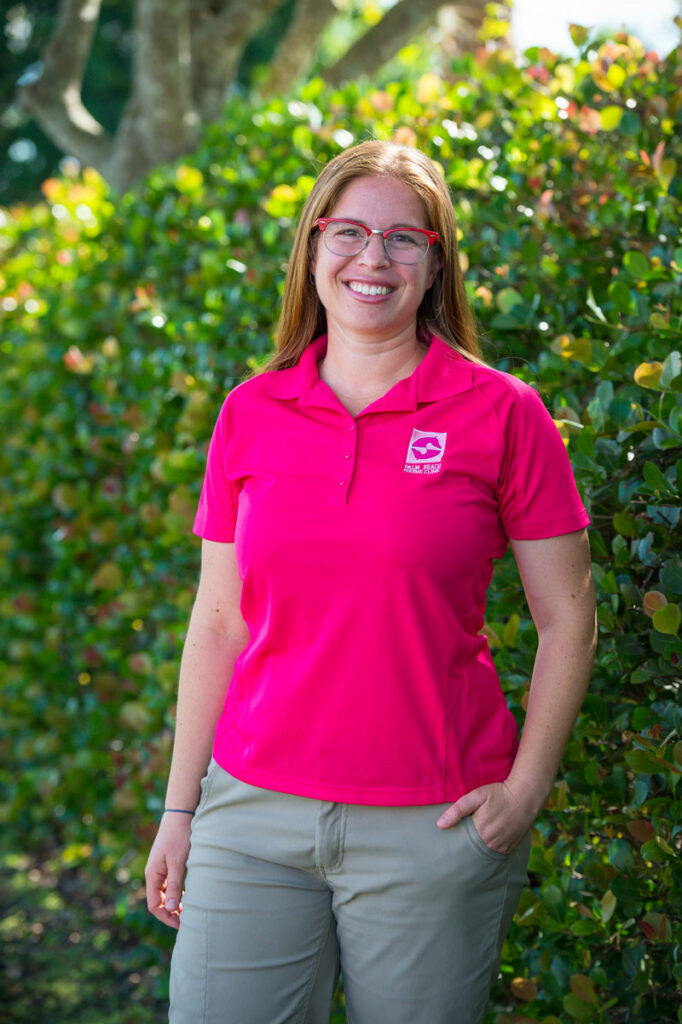
Dr. Janet Greenfield-Davis knew she wanted to be a veterinarian since elementary school. She grew up riding and competing on the hunter/jumper circuit in California before attending California Polytechnic State University and graduating from the University of Glasgow School of Veterinary Medicine in Glasgow, Scotland. Working alongside her husband Tyler Davis, Janet joined the Palm Beach Equine team as an intern before accepting a full-time position in 2010.
What inspired you to be a veterinarian?
I started riding at eight years old in a little field at the end of my street. As I started to grow up, my dad got me taking lessons and competing. He asked me one day when I was 11, ‘What do you want to be when you grow up’? I told him that I wanted to be a veterinarian and work on horses. He never let me forget that, so I grew up and became a veterinarian.
What is it like to work with your husband every day?
It’s wonderful. How many people can say that they get to see their significant other throughout the day, work on cases together, and bounce ideas off each other? We have worked together since the day we met. We went to school together, sat together in class and now we work together. I absolutely love it.
Have your children inherited the animal-lover gene?
Oh yes! We have two girls – Zella is two and Maisie is five months. Zella comes on calls with me regularly. She has her own toy stethoscope in my truck.
What is your specialty?
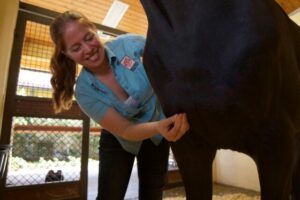
I specialize in acupuncture and herbal medicine. Both piqued my interest in vet school, and when I came to Palm Beach Equine, there was an opening for an acupuncturist. I really love having a way to treat animals without using drugs or steroids. It’s one more method to help equine athletes reach peak performance and is gaining more and more popularity. When I first started, people didn’t embrace it as much, but now even more doctors are starting to turn to it for cases they are not sure how to diagnose. With all the strict rules in FEI, it is a way to make a horse feel better without using drugs.
When you are not working, where can we find you?
Hanging out with my kids and my husband. We try to do family things as often as we can.
What advice would you give to someone considering vet school?
It’s a long, hard road but if you love it, it is so worth it.
What do you like about being on the Palm Beach Equine team?
We have all the diagnostic equipment we could ever need, and I love the quality of practitioners that we have at our practice. We always work as a team – everyone’s number-one goal is the best care for horses and animals in general.
Name one thing most people don’t know about you?
I used to swing dance. I taught lessons and performed for a long time.
On May 10, 2013, Dr. Janet Greenfield-Davis participated in career day at Elbridge Elementary School. Elbridge Elementary is one of many schools that Dr. Greenfield-Davis has donated her time and knowledge to educate our young students of today on equine veterinary medicine. Dr. Greenfield-Davis is the official veterinarian for Vinceremos Therapeutic Riding Center, which focuses on equine-related programs for special needs children. Dr. Greenfield-Davis enjoys educating the community while raising awareness of equine health.
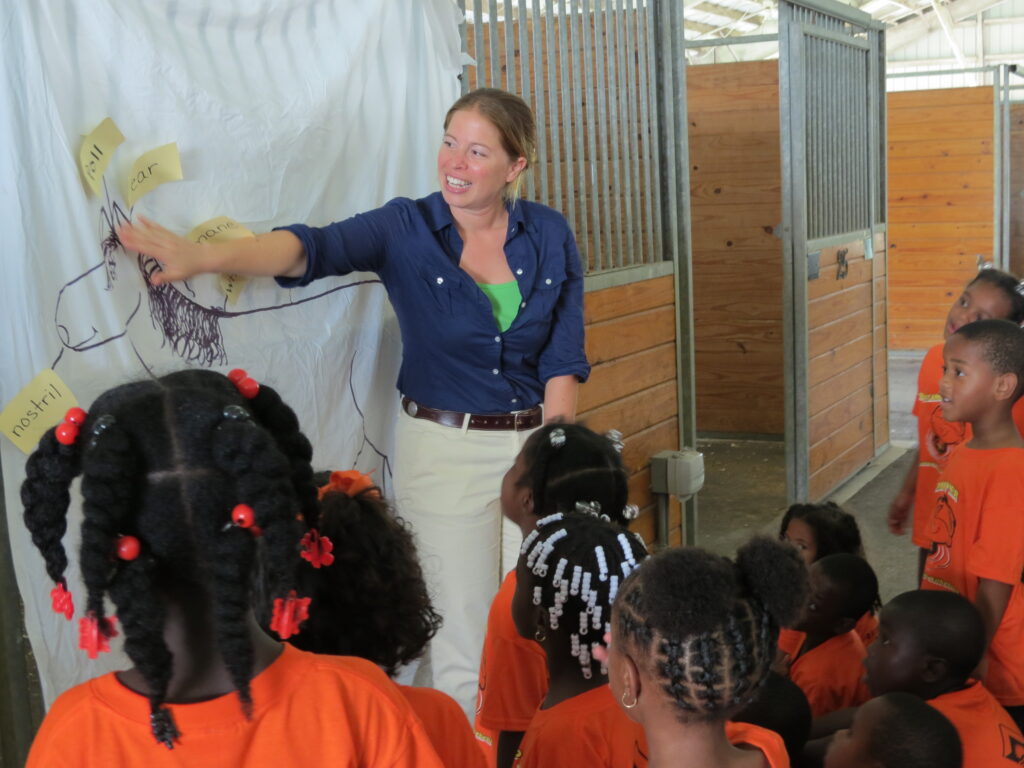
“Educating our community and public service is a culture that we emphasize at Palm Beach Equine Clinic”, stated Dr. Scott Swerdlin, President of Palm Beach Equine Clinic.
Dr. Ryan Lukens recently completed an internship at Palm Beach Equine Clinic. Dr. Lukens excelled during his internship and was presented a contract toward a long and successful future with Palm Beach Equine Clinic. In the spirit of our mission statement, Dr. Lukens presented a lecture to 200 first graders concerning the anatomy of the horse with the Horse Tales Literacy Program. This event occurred at Good Earth Farm in Loxahatchee on Friday, May 17th.

“Dr Lukens was wonderful. He was knowledgeable and very patient with the first graders”, said Shelley LaConte, South Florida Director of the Horse Tales Literacy Project. “He had a smile on his face the whole day. It was a pleasure working with him. We were very grateful for his time and glad he is a part of Palm Beach Equine Clinic.” If you or any of your organizations would like a lecture or presenter please call Eques Solutions at 561-227- 1537.
